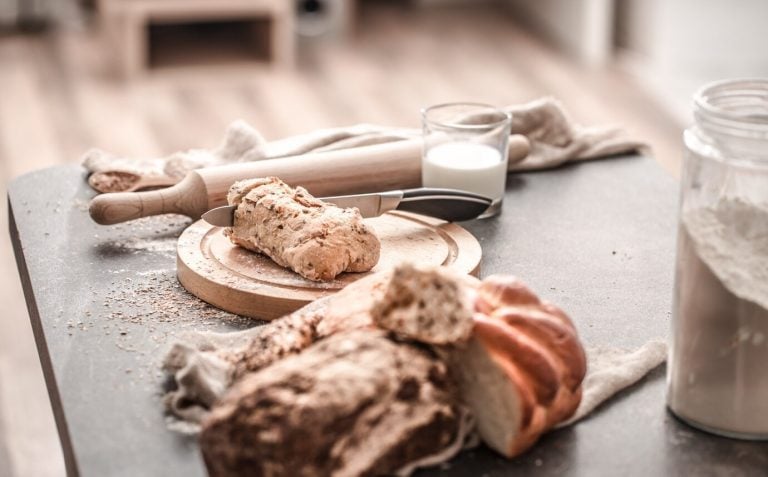Have you ever been told your cookies or cakes are “too good not to sell”? That moment when friends push cash into your hands after tasting your sourdough? You’re not alone. Thousands of home bakers stand exactly where you are – with talent in their hands but uncertainty about turning passion into profit.
Here’s the truth about starting a home bakery: the legal process scares away more potential bakers than any recipe failure ever could. The good news? It’s not nearly as hard as most people think.
The path to a legal home bakery isn’t complicated – it’s just unfamiliar. While exact requirements vary by location, the basic framework is surprisingly similar across most states. What most aspiring bakers don’t realize is that 49 states now have cottage food laws specifically designed to help small-scale food producers get started.
Getting your home bakery license isn’t about navigating endless red tape – it’s about following a clear step-by-step process that protects both you and your customers.
Ready to transform your kitchen into a legitimate business? This complete guide breaks down exactly what you need to know about how to get a home bakery license without the stress, confusion, or costly mistakes that stop most people before they start.
Boost customer satisfaction with just a few clicks
Most-Loved Features:
- On-demand drivers
- Real-time GPS tracking
- Delivery confirmation photos
- Over 50% of customers report a smoother delivery experience
Step 1: Research Home Bakery Regulations
Every state allows some form of home-based food sales under cottage food laws.
To start, check what you can bake and sell from home in your local area.
Get familiar with local rules to keep your home bakery legal.
Understanding Local Regulations For Food Products in Cottage Food Operations
Having a bakery business out of your home is possible, but it starts with understanding local regulations. Zoning laws often dictate where businesses can operate, so it’s essential to check if your home qualifies.
Your city or county planning office is a good place to start. They will have zoning maps and guidelines. In addition to zoning, see what types of food sales are allowed. Both the range of potential income and what you can sell depend on these details. States often allow shelf-stable goods like cookies, loaves of bread, and candies. However, highly perishable items usually need closer regulation.
The potential profitability of a home bakery often rests on knowing these regulations well. If you’re operating within legal boundaries, you save potential fines and protect your reputation. Understanding your local regulations is not just about staying legal; it’s about maximizing what you can sell. Correctly navigating the legal landscape ensures you can offer a wide range of products, attracting diverse customers and potentially increasing profits.
Identifying Applicable Food Safety Standards For Environmental Health and Public Health
Knowing food safety standards is crucial for home bakers. Investigate local hygiene requirements for home kitchens. Home kitchens are subject to certain standards to ensure safety. Some states like California and Texas have specific cottage food laws requiring kitchens that prepare food to be inspected and certified.
Hygiene plays a huge role in operating a legal business. Safe storage and correct labeling prevent foodborne illnesses. In 21 states, you might need food safety training or certification to start a home bakery.
Handling certifications are often processed through a local health department. Some places provide online courses, which can be a convenient option. Understanding and adhering to these standards ensures your products are safe and reliable for consumers. This builds trust and encourages repeat customers. Food safety isn’t just about avoiding contamination; it’s about the peace of mind of knowing food products for your customers are safe.
Gathering Information From Local Licensing Offices About Home Kitchen Business
To get precise answers about starting your store or home bakery, your local licensing office is a vital resource. Most cities and counties have dedicated websites offering guides and FAQs.
They outline the home bakery license required in your specific area. While online is convenient, sometimes you will need to make a phone call or even a visit. Face-to-face interactions can resolve complex questions quickly. For example, some states have limits ranging from $5,000 to $250,000 on annual sales, depending on your locale.
Contacting your local authorities gives you the most accurate, up-to-date information. It can help avoid misinformation, especially as rules can change. Initial inquiries might seem time-consuming, but they streamline the process down the line. This approach positions you better in terms of legal compliance and helps build a foundation for future expansion or specialization.
Step 2: Explore Licensing Requirements for Home Bakers
Identify your unique baking niche for the competitive edge.
Ensure all permits and documents are ready for a smooth start.
Understand the need for potential additional registrations.
Home bakers eager to set up shop need to navigate multiple layers of legal requirements. Understanding these is crucial for peace of mind and smooth business operations.
Identifying Your Baking Niche
Finding the first product labels right niche is essential. The market for home-baked goods is diverse, ranging from everyday staples to specialty dietary items. You should choose products that align with local demand. A recent survey found that nearly 30% of consumers are interested in gluten-free or vegan options. Specialization not only meets unique customer needs but also reduces competition.
Applying For Necessary Permits For Your Cottage Food Operations
Securing permits is a key step in formalizing your home bakery. Local public health departments usually require an inspection of your kitchen. You should make sure your kitchen complies with health and safety standards. Wolters Kluwer stresses the importance of understanding the varying requirements “across state, county, and city lines.”
Step 3: Review Home-Based Food Business Laws
Get legal with occupation permits and business registration.
Protect yourself and your business with proper insurance.
Track finances better with dedicated banking.
Learning About Home Occupation Permits
Home occupation permits can be crucial for ensuring that your small business doesn’t run afoul of local zoning regulations. These permits often dictate what kind of business activities are permissible within residential spaces. Every locality has its own rules about home-based businesses.
In some places, these rules are very strict. For instance, you might be limited in the type of signage you can display, the number of visitors you can receive, or the amount of space used for business purposes. Not all home bakeries require a home occupation permit, but it’s wise to check with local zoning offices. They can clarify if such a permit is necessary for your operations.
Insurance Considerations For Home Bakers
While a home-based bakery or food market might feel personal, it’s still a serious business. Without the right insurance, unexpected incidents can lead to significant financial loss. 1 in 4 small businesses faces an event requiring insurance claims. If your goal is to protect not only your investments but also your peace of mind, look into liability insurance specifically for food businesses.
Opening a Dedicated Bank Account
Separating your business and personal finances is crucial for both legal and practical reasons. Mixing the two can confuse your bookkeeping, cause tax complications, and make your business appear less professional. Establishing a dedicated business bank account makes tracking revenue and expenses more straightforward, aligns with potential audit needs, and facilitates easier record-keeping and financial planning.
Step 4: Implement Starting a Home Bakery Business Steps
Know your costs and equipment needs.
Build a brand and use social media.
Market smartly for local reach.
Budgeting Costs for Equipment and Supplies
List Essential Baking Equipment
Starting a home bakery doesn’t mean buying every gadget out there. Focus on the essentials. You’ll need a good oven, mixing bowls, baking sheets, a sturdy mixer, and measuring tools. These form the backbone of your operation. This ensures you have what’s needed to make quality products.
Estimate Costs for Ingredients and Packaging
Calculating costs for ingredients and packaging is crucial. Ingredients like flour, sugar, butter, and eggs are staples. You can buy in bulk if possible. For packaging, consider simple and cost-effective solutions that still look professional. On average, startup costs for a home bakery can range from $5,000 to $10,000. This estimation helps in planning your budget better and setting prices that cover costs while ensuring profitability.
Establishing Your Unique Brand
Develop a Brand Name
Your brand name is often the first thing potential customers will notice. It should reflect what your bakery is about. Think of names that convey your style and specialty. A memorable name helps to establish recognition in the market. Brainstorm with friends or family if you’re feeling stuck, and ensure the name is not already in use by another business.
Design a Logo and Create a Basic Website or Social Media Presence
Creating a logo gives a visual identity to your brand. You don’t need to splurge. Many affordable graphic design services can help. A simple website or active social media pages like Facebook and Instagram are key. These platforms allow you to reach customers easily. Social media is crucial, with 71% of consumers more likely to buy from brands they follow. Share photos of your products, and updates, and connect with local customers.
Creating a Marketing Strategy
Utilize Social Media Channels to Reach Local Audiences
Social media is one of your most important tools. Focus on platforms popular with bakeries, like Instagram and Facebook. Share engaging content regularly. Post pictures of freshly baked goods. You can use hashtags relevant to your area to get noticed by local customers. Posting on these platforms not only showcases your products but also builds your brand image within the community.
Offer Samples to Local Businesses or Events for Exposure
Handing out samples is a straightforward way to get attention. Partner with local cafes or attend events where you can offer samples of your items. This can create word-of-mouth marketing, which is a powerful promotional tool. Cookies and brownies are top sellers, so consider offering them first. This helps in gaining local recognition quickly and can drive initial sales.
Cottage Food Operations and Home Bakery License

Starting a home bakery is more than just sharing your passion for baking—it’s a real business that needs a proper legal foundation. By following the steps in this guide—researching local regulations, securing the right permits, understanding food and environmental health and safety laws, and setting up proper business structures—you’re building a bakery business that can thrive legally and safely. One crucial aspect to consider as you grow your bakery is optimizing how you manage orders. Enhancing your order system, whether through technology or better processes, can significantly boost your profits. Consider reading about how to improve your order takeout system for greater success in your business.
Effectively managing your order takeout system is key to maximizing your bakery’s efficiency and profitability. Implementing streamlined order processes can reduce errors and enhance the customer experience, paving the way for repeat business and favorable reviews. Exploring innovative strategies for order handling will not only save you time but also strengthen your brand reputation in the competitive home bakery market.
Streamlining your ordering process is essential to increase efficiency and customer satisfaction. By adopting modern tools and approaches tailored specifically for food businesses, you can reduce errors, speed up order fulfillment, and enhance the overall experience. Delve deeper into effective methods for optimizing your order takeout procedures to elevate your home bakery’s profitability.
Remember to note that each location has different requirements, so direct contact with your local health department and business licensing office is essential. It is best to not skip the insurance step either—protecting your business from potential liabilities is just as important as creating perfect pastries.
The path from home baker to professional business owner takes time and attention to detail, but the satisfaction of building a legitimate business around your baking skills makes it worthwhile. You should start small for your cottage food operations, follow regulations carefully for a home bakery license, and grow at a pace that maintains your product quality and your sanity.
Your home bakery journey begins with proper licensing, but it continues with your commitment to excellence in both your food products and your cottage food business practices. Now, preheat that oven and start baking your success story! To elevate your brand and entice customers, consider investing in personalized packaging that reflects your bakery’s unique style. Using custom cake boxes not only protects your delicious creations but also adds a professional touch that can significantly boost your sales and customer loyalty.
Beyond just protecting your baked goods, customized cake boxes provide an excellent opportunity to reinforce your brand identity. Thoughtfully designed packaging can turn first-time buyers into repeat customers by delivering a memorable unboxing experience that reflects the quality and care you put into your products. Investing in attractive, sturdy, and eco-friendly packaging options not only impresses customers but also encourages them to share their delightful purchases on social media, organically expanding your bakery’s reach.














